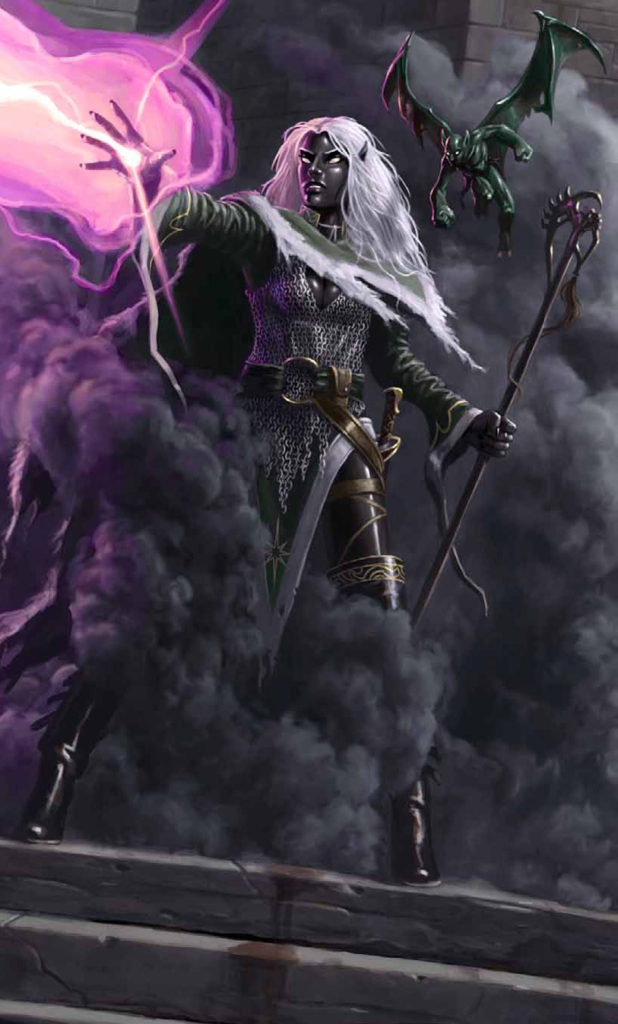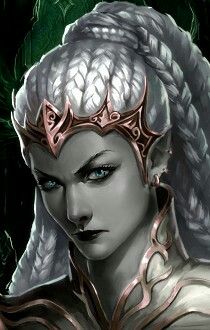Nanill Vandree

Nanill Biography
“When you close your doors, and make darkness within, remember never to say that you are alone. For you are not alone, nay. God is within, and your genius is within. And what need have they of light to see what you are doing?”
Nanill is the 8th and final member of a set of Drow Paragons, birthed to be an exemplary tool in the web of the Underdark. He rejected the sword, the dagger, the shield, and the principles of Lloth. He yearned to be taught to be a priest, a largely unusual profession for a male in a matriarchal society. Nonetheless, he never let his dreams go, and used his time to read as many books as he could find, desperate for an answer to his questions. He became a novice wizard, and this satisfied his superiors for as long as they cared to be involved with his training.
But everything changed when he stumbled upon the profane and ultimately sinister teachings of none other than the Lich-God himself – Vecna. The Whispered one, the Lord of Secrets, rewarded the yearning mind of Nanill with secrets and knowledge that changed his perspective forever, and made him feel for the first time as if he saw the world for what it was. He zealously pursued the tenants of the whispered pact, becoming both a Cleric and a Wizard in his time. In his wake were the eyes and severed hands of whoever was unfortunate enough to get between his brothers and their goal.
The duality of divine and arcane magics – and the powers they offered, only served to entice and encourage Nanill to become a Mystic Theurge, metaphysically walking two paths at once. From his powers offered by the divine he healed contagions of blood and soul, wounded limbs and punctured organs. Cracked ribs and lost senses. With his arcane magics, he warded his allies, his chambers, and prepared unique spells that supported his brothers.
Devotion and patience lead Nanill to eventually establish his own cult of Vecna, finding permanent housing within the sublevels of a now reclaimed Church of Mystra. The takeover was not violent, but clear. He smashed all the statues of Mystra, taking their heads clean off. He also tore off a hand from each statue, to symbolize his mysterious patron. On the other hand, he painted a blue eye, to symbolize that no one was ever free from his otherworldly gaze.
He burned all the paintings, and tapestries, anything that did not sing praise to Vecna. The only thing he didn’t burn were the books, even the holy texts, which he eventually found a spot for in his ever-expanding library. Instead of acting with short term interests, he decided to play the long game, and act as respectable, friendly, and generous as possible. Instead of forcing the church’s members to practice his religion, he tolerated their beliefs, under the condition he would be the sole practitioner of the new church’s programs. Every speech, every confession, and every document go through or comes from Nanill, one way or another.
He quietly nurtured his following, and when his first church’s wayfarers were slaughtered during unforeseen circumstances, he took it upon himself not to be discouraged, but to double down his efforts. He spent thousands of gold coins, and practically all his free time casting spells and wards up and down throughout his property. He spent a great deal of time making deals with even druids to terraform and adjust the church’s grounds to his liking, after it was transported. He made sure he “worked” church hours every day, hearing pleas for miracles, confessions, and healing the destitute. When the wretched or deprived would ask what a price for such generosity was, the answer was always simple. A favor.
After weeks, and months, the people began to revere Nanill as a type of saint. Someone who creates food and water for the hungry, heals the blind and cures the sick. Repairs destroyed limbs, and even communes with the dead. Many who don’t even attend his services and have heard through word of mouth that the “Church in Hosuth” is a great place for help when you need it. Not before long, entire sections of his church became living quarters for the truly homeless and destitute. The price they paid for this aid was not in coin, but in the constant unawareness that they were being watched, and ultimately manipulated. At first, a few unruly patrons got the idea to try and steal or be otherwise “rude” within the confines of the church and discovered swiftly and permanently that this was a bad idea.
No one ever heard of what punishments were sanctioned. No one ever heard of where those people went after they were “cast out”. Just that they had found peace with their new paths in life, and those who stayed true to the codes of conduct were safe. Worse yet, no one would suspect that the scrawny, always smiling priest of the temple was the kind of sadist who would hurt them.
Instead, anyone who was suspect of going against the wishes of the “father” were reported by the many eyes and ears laying on the streets, hanging inside the shops, and walking around the town. Anyone who felt a degree of loyalty to the clergy would happily confess they saw someone shady enter town, someone with unusual weapons or looks, or even that someone they know was planning to do something “illegal”. In turn, those who helped Nanill by feeding him gossip were generously rewarded with supplies, services, and protection.
Slowly and surely, he nurtured his powers and his assembly, never bragging or exposing the ultimate nature of his hopes and aspirations to anyone. He forbids the mention of the name Vecna in the top level of his church, making it clear that anyone who attended his services would only ever hear the name “God” or “The God”. He made his sermons general, ambiguous, neutral, and seemingly altruistic.
This approach, opposed to demanding the worship of his strange deity, rewarded him with many congregants who blindly followed his creed and word, but couldn’t even tell you what the name of their god was. If they could, in belief and soul, it is none other than Vecna.
His only confidant that would ever hear of the truly unholy machinations of his mind was none other than the displaced acolyte who ran services in Mystra’s name before him. All more unusually, he nurtured a conservative romantic relationship with her, affording her unique protection and rights to travel wherever within the lower levels of the church. The only others who were allowed in the lower sanctum were Nanill’s own guards, or his brothers. If you found yourself in the darkness of his basement, no torches, no windows, no comfort but cold concrete and distressing smells, well, you are either in trouble, or about to be in trouble. And you probably won’t leave.
Or if you do, you might find that something was taken from you, if you aren’t outright leaving in pieces.
After hours, the church in Hosuth, the home of a unique cult of Vecna, is a different place. One where dreams take the form of nightmares. Where skulls lie in every corner, watching you. The silence is only ever broken by chanting or screaming, neither being heard above. There are no adornments, no banners, no signs, no indications. There are but two statues, at the very end of the basement’s hall, in the large antechamber. A giant statue of Vecna, and directly in front of it – a statue of a hand forming an open palm, palm facing up.
Nanill takes great pride in everything he does, despite feigning humility. He is zealous, constantly converting people to join his cause, leading him to form a small group that actually composes the cult of Vecna. His brother Istoshin, an adopted “son” by the name of Aven, the acolyte, a cell of six Bronze Dragonkin, two female vampire servants who were “liberated” and a horde of orcs that joined under the banner of his brother. He calls his motley crew “Vecna’s Horde” and considers his cult’s expansion more important than being paid any price, be it in gold, jewels, or magic items.
If he’s not on a mission, Nanill follows a strict schedule. He wakes up just before first light. He spends his first hour praying and reviewing his spells – by early morn he is practicing services, which run until late afternoon. By dusk he closes the doors of his church and attends to the matters he prefers to keep a secret.
Supposing these affairs are taken care of or scheduled for a later time, Nanill often spends his time reading in his study, or tending to the garden he’s building around the church. Through both magic and labor, the once dull swamp that surrounded his church was replaced with solid dirt, stone pathways, and foliage. Every once and awhile an animal might be spotted by the plants, not many species call the gardens home. To account for this, Nanill adorns his gardens with solid gold statues of a few birds, common animals like squirrels, and suspiciously – people. The statues are lifelike and often posed, with plaques below them that offer a proverb of advice or wisdom. The most recently installed seems to be missing a few fingers, and offers the saying “Be careful what you wish for!”
Affiliations: The Brothers Vandree, House Freth, The Twisted Tower Trading Company, The Cult of Vecna
Also known as: He who plays with dead things, The Cleric,
“I can heal that.”
“I would gladly bear any curse to save my people”
“Anything, for a price.”
